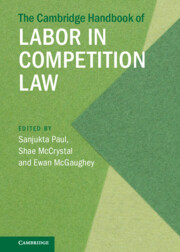8 results
7 - American Antitrust Exceptionalism
-
-
- Book:
- The Cambridge Handbook of Labor in Competition Law
- Published online:
- 05 May 2022
- Print publication:
- 26 May 2022, pp 113-126
-
- Chapter
- Export citation
Contents
-
- Book:
- The Cambridge Handbook of Labor in Competition Law
- Published online:
- 05 May 2022
- Print publication:
- 26 May 2022, pp v-vi
-
- Chapter
- Export citation
Preface
-
- Book:
- The Cambridge Handbook of Labor in Competition Law
- Published online:
- 05 May 2022
- Print publication:
- 26 May 2022, pp ix-x
-
- Chapter
- Export citation
Contributors
-
- Book:
- The Cambridge Handbook of Labor in Competition Law
- Published online:
- 05 May 2022
- Print publication:
- 26 May 2022, pp vii-viii
-
- Chapter
- Export citation
Copyright page
-
- Book:
- The Cambridge Handbook of Labor in Competition Law
- Published online:
- 05 May 2022
- Print publication:
- 26 May 2022, pp iv-iv
-
- Chapter
- Export citation
1 - Labor in Competition Law
-
-
- Book:
- The Cambridge Handbook of Labor in Competition Law
- Published online:
- 05 May 2022
- Print publication:
- 26 May 2022, pp 1-10
-
- Chapter
- Export citation

The Cambridge Handbook of Labor in Competition Law
-
- Published online:
- 05 May 2022
- Print publication:
- 26 May 2022
9 - The Case for Repealing the Firm Exemption to Antitrust
- from Part II - Labor Law Is Out of Date
-
-
- Book:
- The Cambridge Handbook of U.S. Labor Law for the Twenty-First Century
- Published online:
- 01 November 2019
- Print publication:
- 05 December 2019, pp 88-96
-
- Chapter
- Export citation



